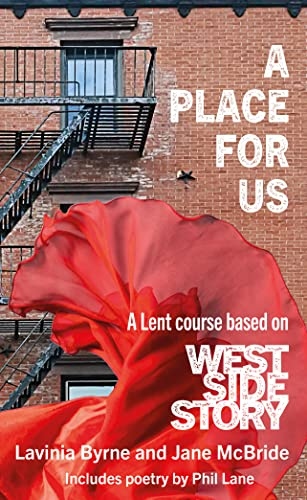A Place For Us: A Lent course based on West Side Story
Taking its cue from Spielberg’s 2021 remake, this set of five studies for Lent focuses on overcoming division in general and racial, sectarian and gender conflicts in particular
 A Place For Us: A Lent course based on West Side Story
A Place For Us: A Lent course based on West Side Story
By Lavinia Byrne and Jane McBride with poetry by Phil Lane, 125 pages (2022)
Darton, Longman and Todd
Reviewed by Terry Young
I love the premise behind this book in pinning West Side Story to a set of Lenten studies, even if I struggle with key conclusions. My wife and I watched a youth production on our first date, so my recollections of the musical will always be tinged with a warmth beyond the staging and score.
I like films as a way into theory. In a different context, when I watched Apollo 13, I recognised a model manager in Gene Kranz (played by Ed Harris in the white waistcoat) and redesigned our software project management module to include an afternoon with Tom Hanks & Co., when a crowd of us would file into a large lecture theatre and watch the film.
Taking its cue from Spielberg’s 2021 remake, this set of five studies for Lent focuses on overcoming division in general and racial, sectarian and gender conflicts in particular. It’s topical and well-written. Lavinia is a well-known Roman Catholic who quarrelled with the Vatican, while Jane is an interpreter for the EU, an Episcopalian with Church of Ireland roots in Northern Ireland.
Their position on gender may rule this book out for many conservative evangelicals. My take is that any study guide sets a starting point and that the benefit depends on how the group engages from there. It’s not where I would start, but the journey will make you think or shrink and that may be just what you need.
I buy wholeheartedly the come-as-you-are appeal but not where we go next. Take, for instance, the Syro-Phoenician woman (p 51-54) where we are told that Jesus’ response, ‘is not what we expect from the Son of God.’ By confronting Jesus, we are told that this woman forces him to rethink his behaviour and so she, ‘changes the course of salvation history.’
This reading gives us Jesus as he should have been rather than as he is. The gospel truth is that we come to Jesus to be changed into his likeness, not the other way around. I hope I’m no less troubled by the story than Lavinia and Jane – and it’s searingly appropriate – but I can’t reach their conclusion. Our instincts are often sound about what is good but as we journey in faith, sooner or later we find ourselves before an alien and inexplicable God. If we perceive the face of an old enemy in such encounters, it may be a sad reflection on those who have represented God in our past rather than a reason to turn away.
Lavinia and Jane have clearly had their battles, which grounds the narrative and shapes it at the same time. What they cannot avoid they readily acknowledge. Lavinia writes (p27), ‘As it is, any prejudice I have is directed inwards to members of my own community whom I regard as ‘bad’ Catholics. Those who reject the present Pope and the teachings of the Second Vatican Council, for instance. That is where my intolerance finds a target. And, of course, like any intolerance, it makes me miserable. I am a work in progress.’
Moving on, Lavinia and Jane provide a varied soundtrack with narrative, analysis, poetry, freshly translated psalms, and swathes of the movie to watch. In the conflicts they address, it is not always a single majority that confronts a single minority. Sectarian conflicts often involve minorities within minorities – historically the case in Northern Ireland where an enclave had its minorities while itself being surrounded by a larger country. Today, some same-sex attracted Christians express their sense of isolation as a celibate minority in a debate between larger parties. Because of this, I would like to have heard a few more voices in the soundtrack.
Still, we are all work in progress. Can this set of studies help you make progress? If you find a robust set of Christian friends to share it with, I think it can. Will it help you progress? I have no idea. I found it challenging, but it’s a book I would rather have read than missed.
Terry Young is a missionary kid who read science and engineering. After a PhD in lasers, he worked in R&D before becoming a professor, when he taught project management, information systems and e-business, while leading research in healthcare.
He set up Datchet Consulting to have fun with both faith and work and worshipped at Baptist churches in Slough for 19 years before moving to the New Forest
Baptist Times, 27/01/2023